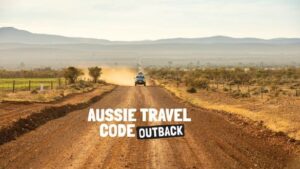Visitors are always welcome in the Flinders Ranges and Outback, and to make tourism sustainable for the landscapes, the region’s tourism body Flinders Ranges and Outback SA Tourism (FROSAT) has launched a campaign promoting responsible visitor messages.

The cheeky online campaign uses Aussie humour to sell its messages of responsible travel which includes staying on tracks, not leaving any rubbish or waste, and getting approval to travel on people’s properties.
The campaign is based on how we all expect visitors to behave when they visit our homes – an unofficial code of conduct. The Aussie Travel Code concept and brand was developed by regional tourism agency WOOF Media in collaboration with representatives from the FROSAT Board.
A strong welcome message underlies the campaign which uses humour to reinforce travel messages about safety and planning before you head to the Outback, as well as how to conduct yourself when you are visiting someone else’s backyard.
When you see the Aussie Travel Code logo, it means you’re travelling in—or planning a trip to—a bloody great place. You’re in for an unreal experience in an incredible part of Australia.
Welcome!
But, Australia’s a big place and things might not be what you’re used to back home.
Starting with South Australia’s incredible Outback, the Aussie Travel Code gives you the insider knowledge you need for this region. It will tell you how to enjoy your trip, stay safe, and be the kind of traveller you would want to meet in your own hometown.
The project has been funded by the Outback Communities Authority and supported by tourism operators, the South Australian Arid Lands Landscape Board, and Regional Development Australia Far North. Jo Fort, co-owner of the Innamincka Hotel and chair of the FROSAT Board, said the need for a campaign like this is long overdue.
“We’ve been hearing from tourism operators, pastoralists and Outback communities that visitors need a clearer expectation of acceptable behaviours when they travel to the Outback, and to have a stronger understanding that it is someone’s backyard – no matter how big it might be,” Ms Fort said.
“The Outback is vast – we have some of the most diverse and fragile ecosystems in the world which people may not realise that once it’s been driven over it may never recover. We’ve also got significant cultural sites and we aim to raise awareness of how to treat these areas.”
Ms Fort said while the idea of minimising traveller impacts on the environment is an international issue and one that is complex and difficult to tackle, the FROSAT Board believes the Aussie Travel Code is a grassroots campaign that has the opportunity to really gain traction.
“We are seeking the support of tourism operators, businesses, government agencies and pastoralists to support this campaign which can be adapted to different regions to promote the messaging. With additional funding and in-kind support, we could really make a difference in this space and promote the amazing region we welcome visitors to at the same time.”
Find out more about The Aussie Travel Code at www.aussietravelcode.com.au.
Follow on Facebook at www.facebook.com/austravelcode and Instagram @austravelcode.















